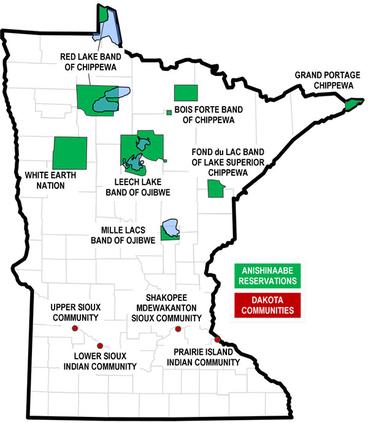The University of Minnesota’s Twin Cities campus is located on traditional, ancestral, and contemporary lands of Indigenous people.
Over the past few years, the University has taken steps to recognize this by adopting a land acknowledgement statement, and by hiring Tadd Johnson to serve as the first senior director of American Indian Tribal Nations Relations.
Beginning last fall Johnson, an enrolled member of the Bois Forte Band of Chippewa and a faculty member at the University of Minnesota Duluth, has taught a workshop through the Humphrey School of Public Affairs that examines the unique relationships between Native nations and the state of Minnesota through a public policy lens.
The half-credit workshop on tribal-state relations explores the history of federal Indian policy, the contentious past of tribal-state interactions, and current efforts to build government-to-government relationships. The workshop has attracted more than 80 students during this academic year.
Preparing future public service leaders
Humphrey School Associate Dean Catherine Squires says it's imperative for a public affairs school to offer this course, which she says will greatly benefit those preparing for careers in public service.
“There are 11 Native nations whose homelands are within the boundaries of Minnesota, and they all have their own governance structures, economic interests, and cultural priorities,” says Squires. “They interact with federal, state, and local authorities on issues from road construction to fishing permits to housing and education. Our students will go into agencies that deal directly or indirectly with these nations, and they need this knowledge to engage in productive relationships.”
The workshop is modeled after a two-day training program Johnson created in 2013 for Minnesota state government employees at the direction of then-governor Mark Dayton.
Dean Laura Bloomberg says she wanted to bring the course to the Humphrey School after seeing the success of the state training program.
“We came to realize that this fundamental knowledge and understanding should be made available to our public affairs students because this information is still woefully overlooked in our K-12 and college curriculum,” Bloomberg says.
As part of the workshop, Johnson and his co-instructor, Associate Professor of American Indian Studies Joseph Bauerkemper, cover the 500-year history of federal Indian policy, the importance of treaties, and the sovereignty of tribal governments.
The students also hear from tribal leaders and state government officials who have established working relationships with each other, and learn about case studies and best practices in tribal-state relations.
Johnson says the goal of the workshop is to prepare these emerging public policy leaders to have productive relationships with Native nations in Minnesota.
“I’m hoping the students understand that tribal governments are not federal, not state; they’re a third type of sovereign that exists within the boundaries of Minnesota,” Johnson says. “As public officials, they are going to eventually have to deal with an Indian tribe. And it would be good if they know they’re dealing with a whole different type of sovereign.”
Key takeaways
Bauerkemper says students also must understand the importance of treaties between tribes and governments, which are still binding legal agreements even though they were signed more than 150 years ago.
“Without those treaties, there is no such thing as the state of Minnesota. There’s no such thing as the United States having any kind of [legitimate] jurisdiction anywhere on this continent,” he says. “Knowing that, the students can honor the obligations that settler people have taken on by entering into those relationships with tribes, and they can function in a good way.”
Bauerkemper says he emphasizes a few key points for students to remember:
- State law, generally speaking, does not apply on Indian reservations.
- The sovereignty of tribal nations is inherent. It is not given to them by the federal government or the state government.
- Treaty relations are fundamental to everything around us. Minding treaty obligations should be the first order of business for the state of Minnesota, counties, cities, and nongovernmental organizations.
“The enthusiasm among Humphrey School students for this class underscores the value of it for future policy makers,” Dean Bloomberg says. “I sat in on the first day of the seminar and students asked the same questions over and over: ‘Why am I just learning this now? Why isn't tribal sovereignty covered in our undergraduate curriculum? Why didn't I learn this in high school?’ The Humphrey School cannot right all of those wrongs, but we can ensure that this important policy topic is included in our public affairs curriculum going forward, and that is what we intend to do.”
'Dubious view' of UMN
Tadd Johnson’s larger role for the University, as senior director of American Indian Tribal Nations Relations is to strengthen relationships between the University and the tribes, and better serve American Indian students, staff, and faculty. He was hired for the new position in late 2019; he says his job is to “quietly agitate.”
“The tribes have a dubious view of the University,” Johnson says, because of the U’s historical and contemporary injustices and exploitation toward Native nations.
One effort to improve those relationships comes in the form of a new project funded through Minnesota Transform, a $5 million grant from the Mellon Foundation to address racial injustice on campus and throughout Minnesota.
The Minnesota Indian Affairs Council will receive $325,000 from the grant to work with tribal nations on writing “their own histories of their relationships with the University, what the present relationship is, and most importantly what the future could look like,” says Johnson. The tribes hope to complete this project by the end of the year.



